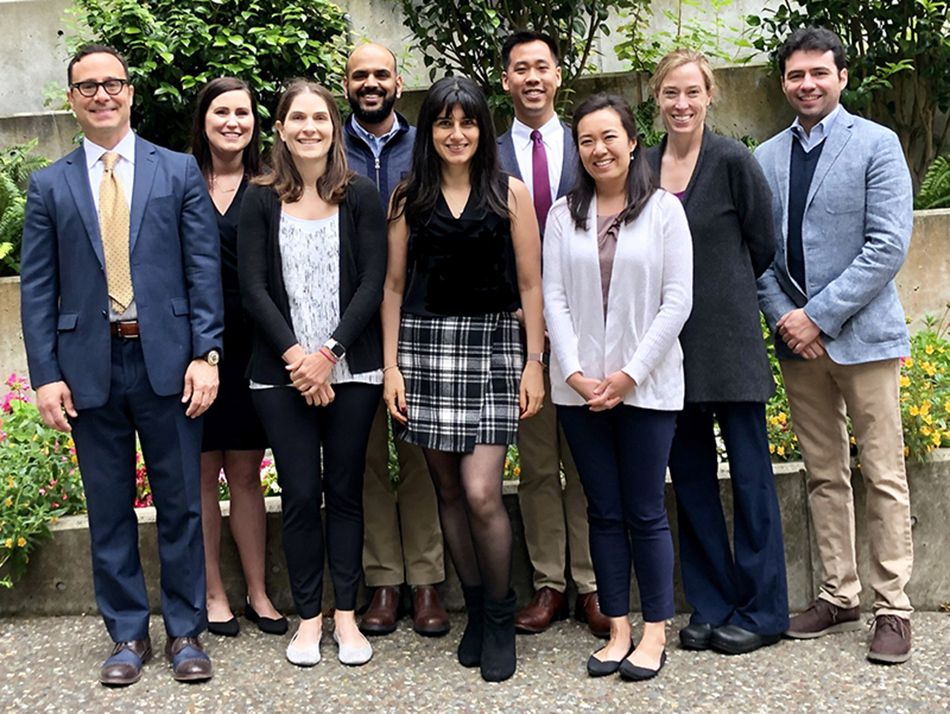Cytopathology Fellowship
Each year, two positions are available in this one-year program. The fellowship provides training in all areas of cytology with a special emphasis on fine needle aspiration biopsy (FNAB) techniques including ultrasound guided biopsy, specimen triage, and smear interpretation. At the beginning of fellowship, trainees receive intensive training and supervision. They are gradually given more responsibility, and ultimately function independently with minimal faculty oversight. Fellows will have access to, and will participate in the sampling of some 4000 specimens per year collected by the FNA clinics at both UCSF and Zuckerberg San Francisco General sites. In addition, large numbers of interesting exfoliative cases are reviewed. Deep-seated lesions are accessed with imaging in collaboration with other departments, and advanced ancillary testing is routinely applied to cytologic material. Fellows also participate in daily cytopathology sign-outs, intradepartmental teaching conferences, and grand rounds.

From left to right: Ron Balassanian, Sarah Calkins, Tara Saunders, Vighnesh Walavalkar, Elham Khanafshar, Kent Truong, Lucy Han, Annemieke van Zante, Roberto Ruiz-Cordero
Not pictured: Britt-Marie Ljung, Theodore Miller, Steven Long, Poonam Vohra, Frederick Baehner, Vimal Krishnan, Nancy Greenland
Faculty Involved with Fellowship
Ronald Balassanian, MD
Frederick Baehner, MD
Constance Chen, MD
Carlo A. De la Sancha Verduzco, MD
Georgios Deftereos, MD
Nancy Greenland, MD, PhD
Elham Khanafshar, MD, MS
Vimal Krishnan, MD
Britt-Marie Ljung, MD
Steven R. Long, MD
Peyman Samghabadi, MD
Annemieke van Zante, MD, PhD
Poonam Vohra, MD
Vighnesh Walavalkar, MD
Current & Future Fellows
2025-26
Tushar Chakravarty, MD, MSc
Timothy Gilpatrick, MD, PhD
2026-27
Andrea Dickey, MD, PhD
Sandra Perez, MD
Requirements
Candidates must have completed three years of AP or AP/CP residency training by the start date of the fellowship. A fellowship in general surgical pathology is highly recommended and candidates with strong surgical pathology training will be favored.
Non-U.S. citizens must possess a permanent resident card or an appropriate educational visa prior to starting a postgraduate medical education program. The Department of Pathology may sponsor J1 visas.
Salary
Fellows will be appointed as a PGY-5.
UCSF GME Trainee Financial Resources
Application
The UCSF Cytopathology Fellowship program has two openings for the 2027-2028 academic year. Applications are currently being evaluated on a rolling basis. To apply, please submit the CAP Standardized Pathology Fellowship Application, along with your curriculum vitae, a personal statement of interest, and a photo of yourself as one single file, in PDF file format. Three letters of recommendation should be sent directly from your recommenders and or program coordinator, also in PDF file format. All application materials are to be submitted in one single file, in PDF file format via email to the Fellowship Program Administrator, Suria Sadat.
For the best experience, we recommend downloading the application using the link below and opening it with Adobe Acrobat software to complete the fillable PDF form.
We encourage and welcome all qualified applications to the Cytopathology Fellowship Training Program. This program is open to all who meet academic, professional, and interest criteria. In accordance with Federal and State law and University policy, the University of California does not discriminate on the basis of age, gender, race, ethnicity, national origin, religion, sexual orientation, gender identity, health, or disability. For detailed information, please visit the Office for the Prevention of Harassment and Discrimination.
Important Dates
Applications for the 2027-2028 Academic year are currently being accepted and evaluated on a rolling basis.
Interviews will be held virtually and offers will be made on a timely basis after virtual interviews are completed.